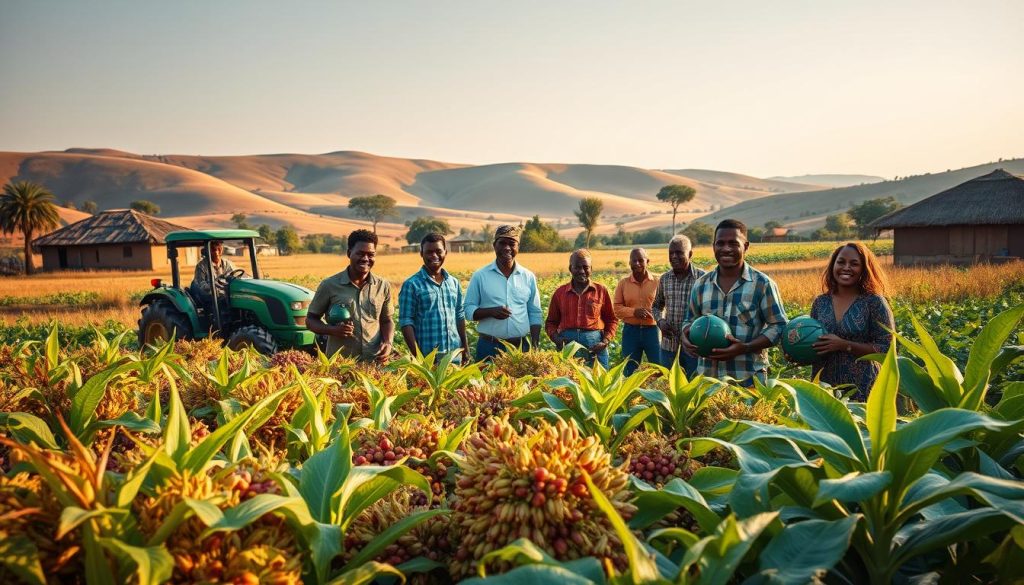Africa is becoming a hotspot for agribusiness, thanks to its vast land, varied weather, and rich resources. The African Development Bank sees agribusiness as key for economic growth. It promises jobs and better food for everyone.
With Africa’s population set to double by 2050, food demand will soar. This makes investing in Africa’s farming sector very appealing.
UK investors have many chances in Africa, especially in growing crops, raising livestock, and processing food. Helping local economies, they also get to be part of a growing market.
The Importance of Agribusiness in Africa
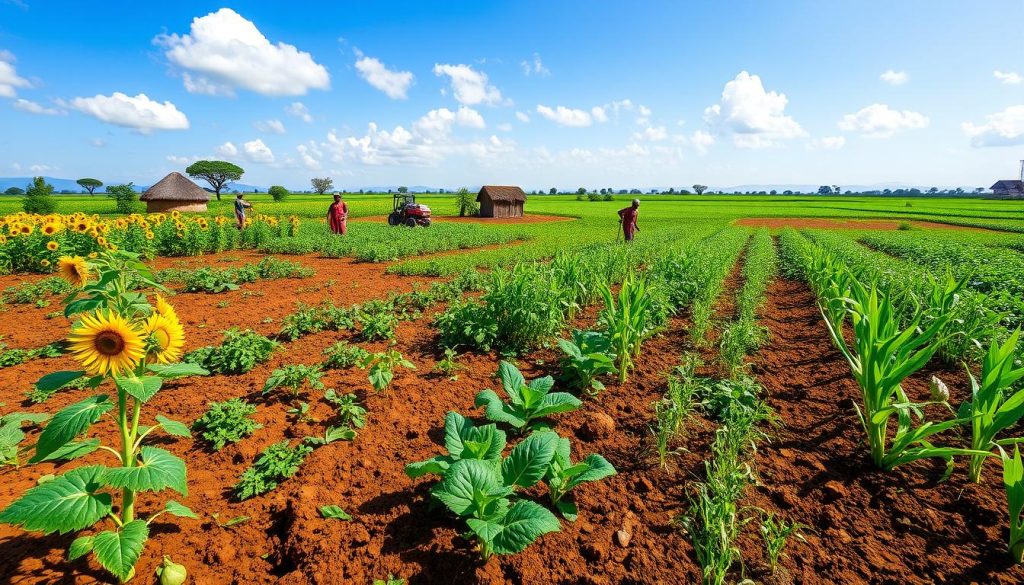
Agribusiness is key for Africa’s economic growth. It’s not just about growing food. It also includes processing, distribution, and retail, adding to the continent’s GDP. Millions of people depend on agribusiness for their income, showing its vital role in supporting lives.
Agribusiness does more than make money. It’s vital for food security, making sure people have access to nutritious food. By improving how food is grown and distributed, agribusiness helps make food more available and affordable.
Rural development is also a big part of agribusiness. As it grows, it creates jobs and improves the lives of rural families. This helps reduce poverty and promotes sustainable living. The African Union’s Agenda 2063 aims to make Africa more food self-sufficient and boost trade within the continent.
African Agricultural Landscape
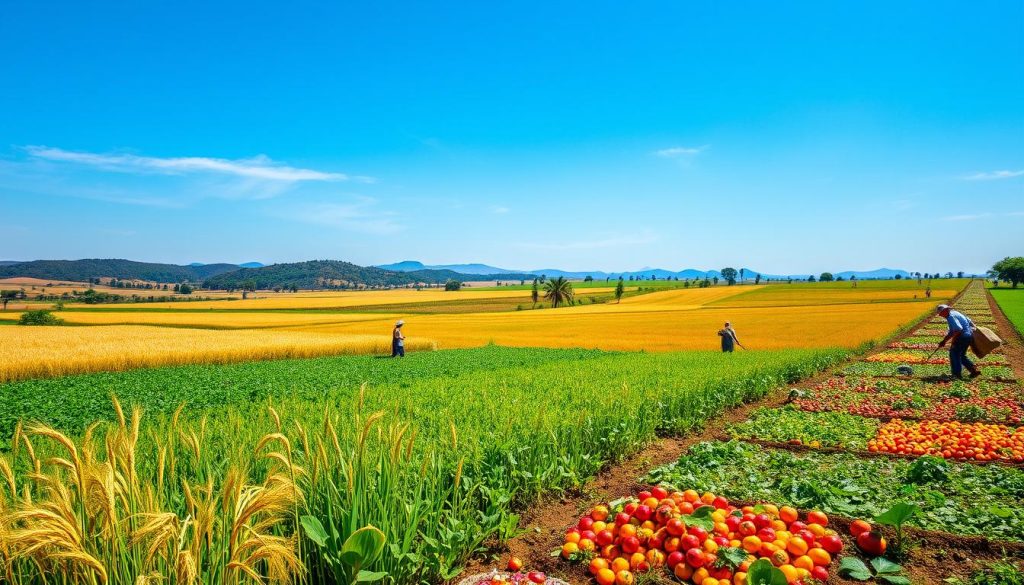
Africa’s farms show a wide range of climates, soils, and ways of farming. This variety lets farmers grow many different crops. Maize, cassava, cocoa, and coffee are just a few examples, showing the vast potential of African farming.
Every area in Africa has its own farming style because of the weather, markets, and technology. East Africa is known for its horticulture, while West Africa leads in palm oil production. These differences shape the farming world in each region.
Knowing about these differences is key for those looking to invest in African farming. It helps them find the right spot to make a difference. By understanding the opportunities and challenges, they can create effective plans for success.
Key Agribusiness Opportunities in Africa
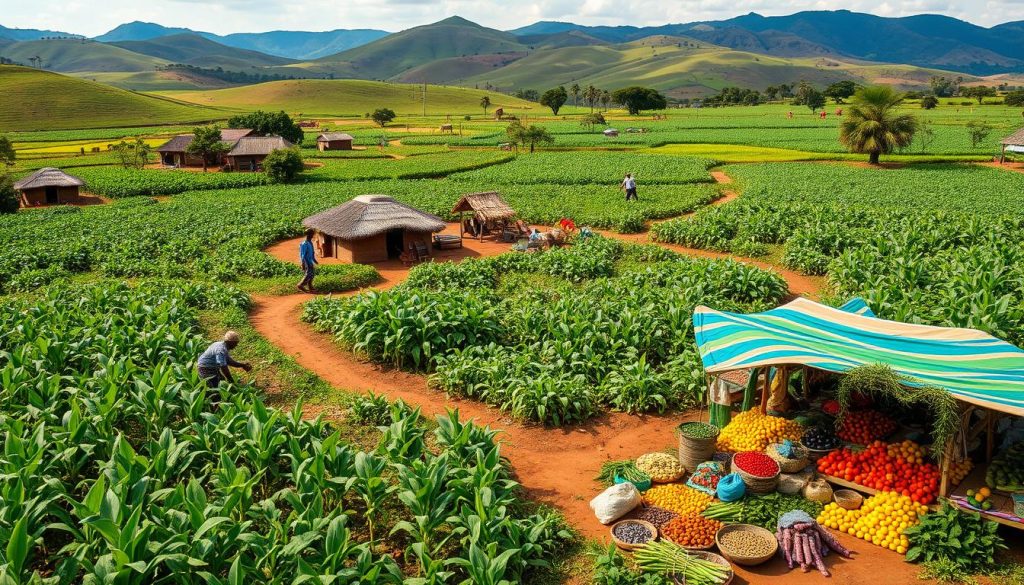
Africa is full of chances for agribusiness to change its farming scene. Crop production is a big chance, where better seeds and farming methods can boost yields. This not only meets local needs but also opens up global markets.
Livestock farming is also key. New breeding and disease control methods can improve herd quality. This sector offers big economic gains, serving both local and export markets.
Agro-processing is another big chance. It adds value to raw farm products, creating jobs and boosting income. This helps reduce food imports, strengthening local food chains.
African countries aim to be self-sufficient in food. These agribusiness chances can help grow the economy. Getting involved in these areas can greatly help the agricultural sector grow.
Agribusiness Opportunities in Africa
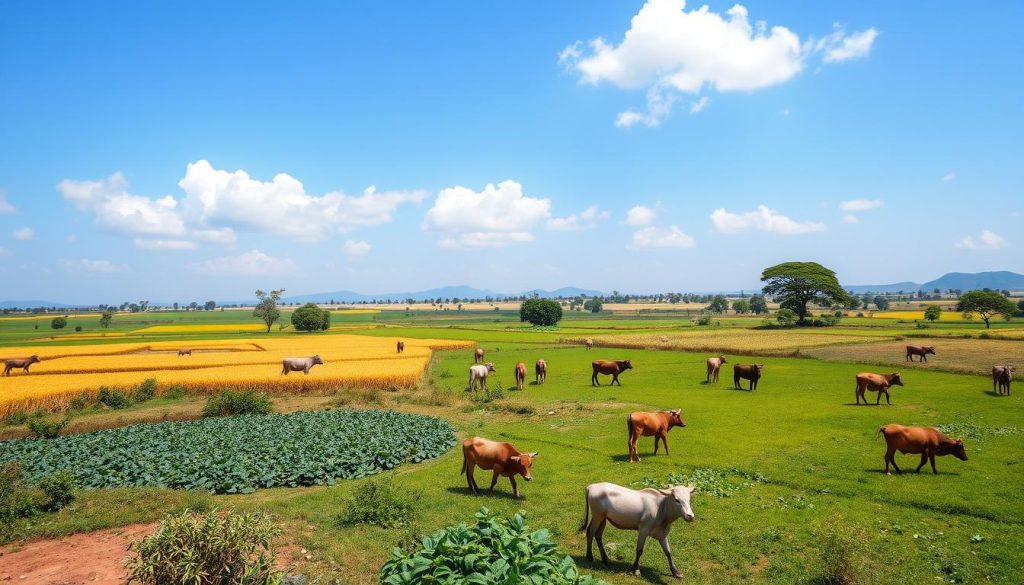
Africa is full of chances for agribusiness, especially in crops and livestock. The continent’s varied land makes it perfect for investment and growth.
Potential Crop Sectors
Horticultural crops like fruits and vegetables are big opportunities. The need for fresh food in cities is growing fast. Other promising areas include:
- Biofuels: Making biofuels from crops is becoming more popular, helping with green energy.
- Organic products: The market for organic food is getting bigger, offering high prices for farmers.
Livestock Farming Innovations
New ways in livestock farming are also promising. Using digital tech helps manage herds better, making farming more efficient. Also, new systems for managing livestock can cut costs and increase what’s produced. The demand for better meat from local farms is also rising.
Investing in Sustainable Practices
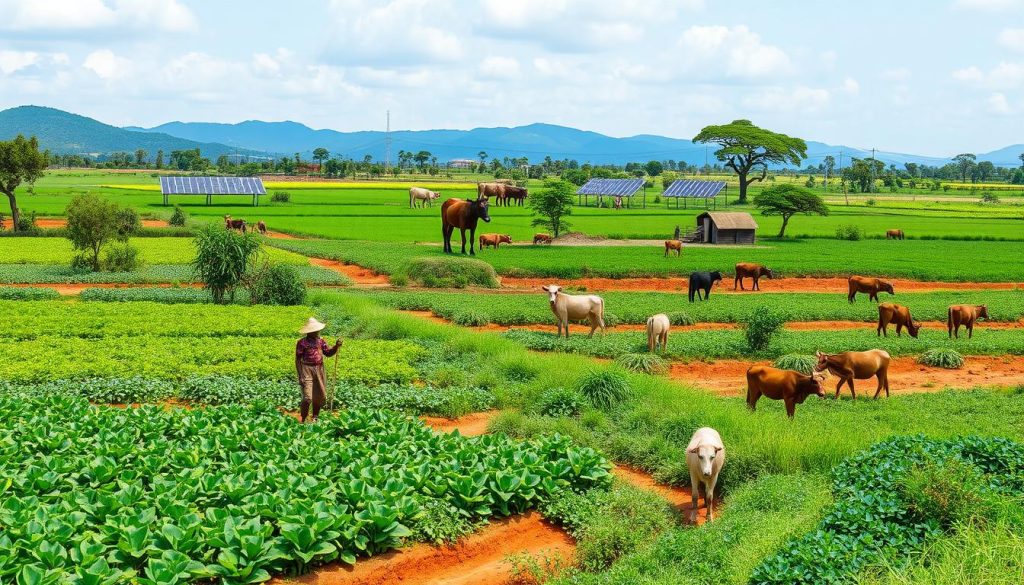
Investing in sustainable practices is key for sustainable agriculture in Africa. It ensures ecological balance and meets the growing food needs. Techniques like permaculture, agroforestry, and organic farming improve soil health.
These methods help reduce the environmental harm from farming. Many investors now choose projects that are both profitable and eco-friendly. This move supports global efforts for sustainable food production and supply chain management.
Investing in sustainable agriculture brings several benefits. These include:
- Lower carbon footprints from sustainable farming.
- Better biodiversity and ecological health.
- Financial gains from eco-friendly practices over time.
Market Trends Influencing Agribusiness Growth
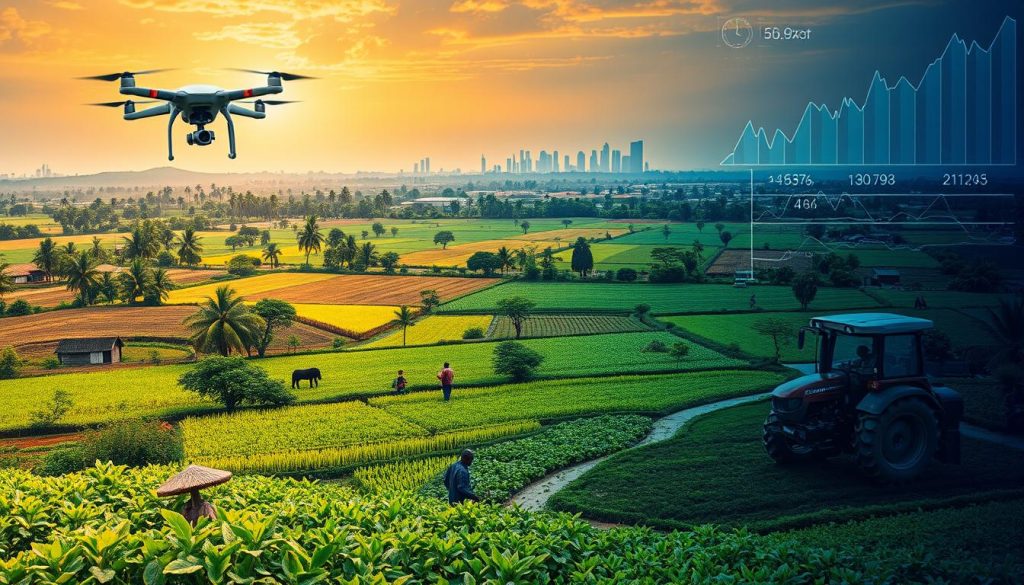
The agribusiness sector is changing fast, thanks to new market trends. People now prefer health-conscious choices. They’re looking for organic products that are safe and good for their health.
This change in what people want to buy is big. It’s making them choose locally sourced food that’s also sustainable. This is good for both their health and the planet.
Shifts in Consumer Preferences
What people want to buy is changing fast. They want to know where their food comes from. This is leading to a preference for food from farmers who use sustainable methods.
This trend is good for health and the environment. Also, new ways of selling food online are opening up. This lets agribusinesses reach more people than ever before.
Government Initiatives Supporting Agribusiness
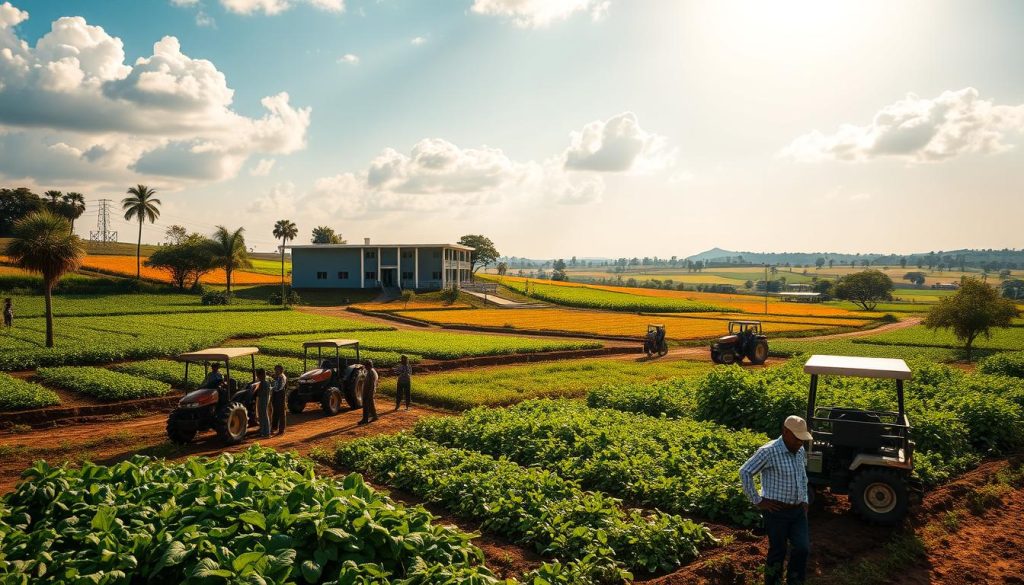
African countries are working hard to help the agribusiness sector grow. They are focusing on strong agricultural policies and investing more in farming. They also offer incentives to attract investors from around the world.
The Comprehensive Africa Agriculture Development Programme (CAADP) is a big push to increase investment in farming. It aims to raise agricultural output, helping to ensure food for everyone and boost the economy.
Now, governments are pushing for partnerships between public and private sectors. This helps bring new ideas to farming and makes the most of available resources. The goal is to build a strong and sustainable farming system.
These efforts aim to make it easier for agribusiness to succeed. Everyone agrees that government support is key to changing farming for the better. It will help make the most of investment incentives.
Challenges Facing Agribusiness Development
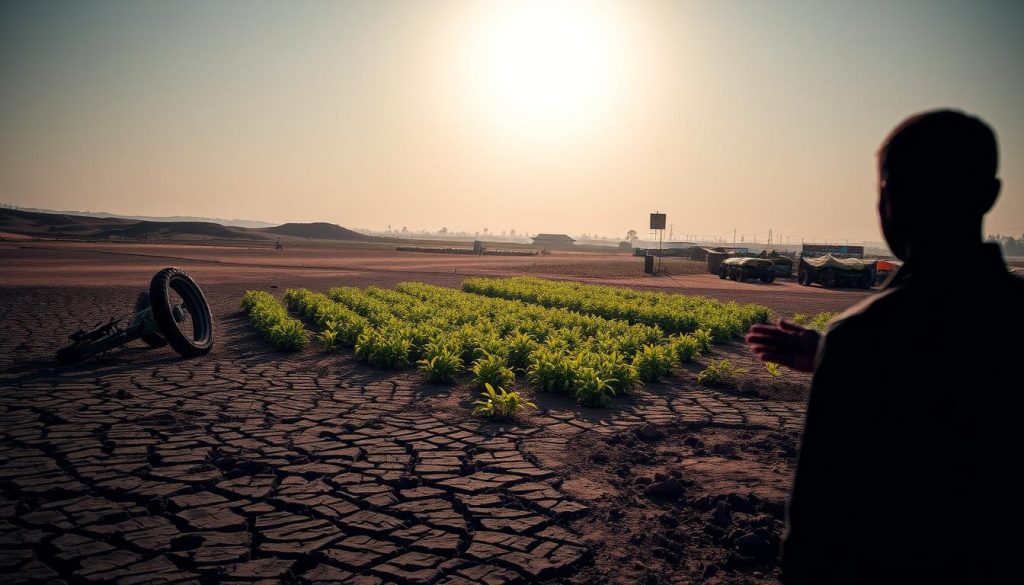
Agribusiness in Africa faces many challenges. Infrastructure issues are a big problem. They make farming less efficient.
Bad roads and lack of transport make it hard to get products to market. This leads to higher costs and longer wait times. It hurts farmers and consumers alike.
Infrastructure Deficiencies
Rural areas often lack good roads. This makes it hard to move products and get to services. Not having enough storage means a lot of food is lost after it’s picked.
Farmers find it tough to get to markets. This means they make less money and waste resources. Fixing these problems is key to better farming.
Climate Change Impacts
Climate change is also a big worry. Weather patterns are getting more unpredictable. This makes farming riskier.
Things like droughts and floods can destroy crops and animals. This makes farmers unsure about their future. They need to find new ways to farm that can handle the changing weather.
Technological Advancements in African Agriculture
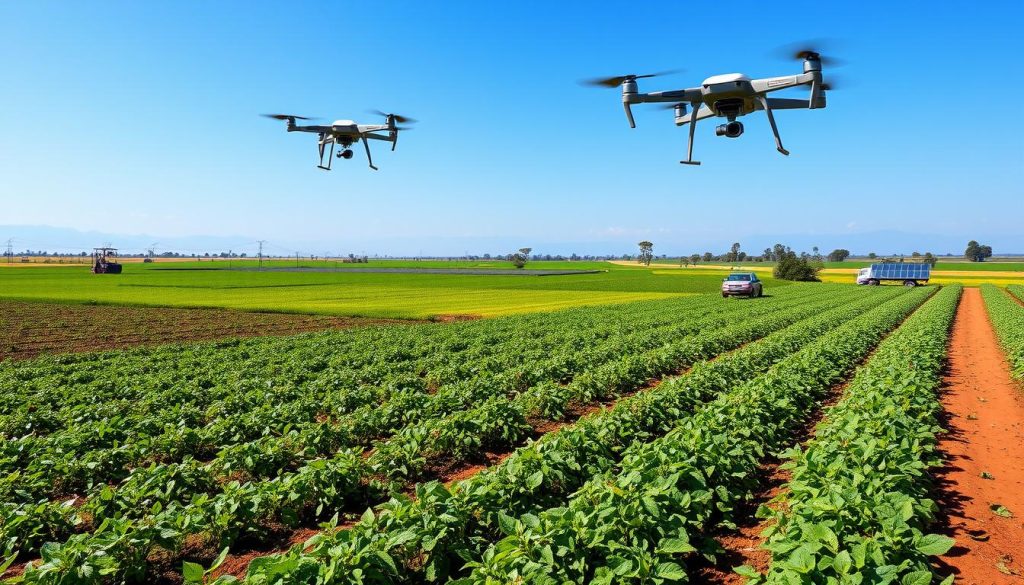
The agricultural sector in Africa is changing fast thanks to new technologies. Innovations like precision farming are making farming more efficient and productive. Precision farming uses satellite images and IoT sensors to help farmers manage their land better.
This approach lets farmers see how their fields are doing and make smart choices. It helps them get the most out of their land and reduce waste.
Digital solutions are also key to modern farming. They give farmers important information, help them find markets, and access funding. These tools are changing how farming works across Africa.
There’s a growing number of startups in agriculture that focus on new tech. They offer solutions like better supply chain management and mobile apps for farmers. This shows that African agriculture is set for a bright future.
Partnerships and Collaborations in Agribusiness
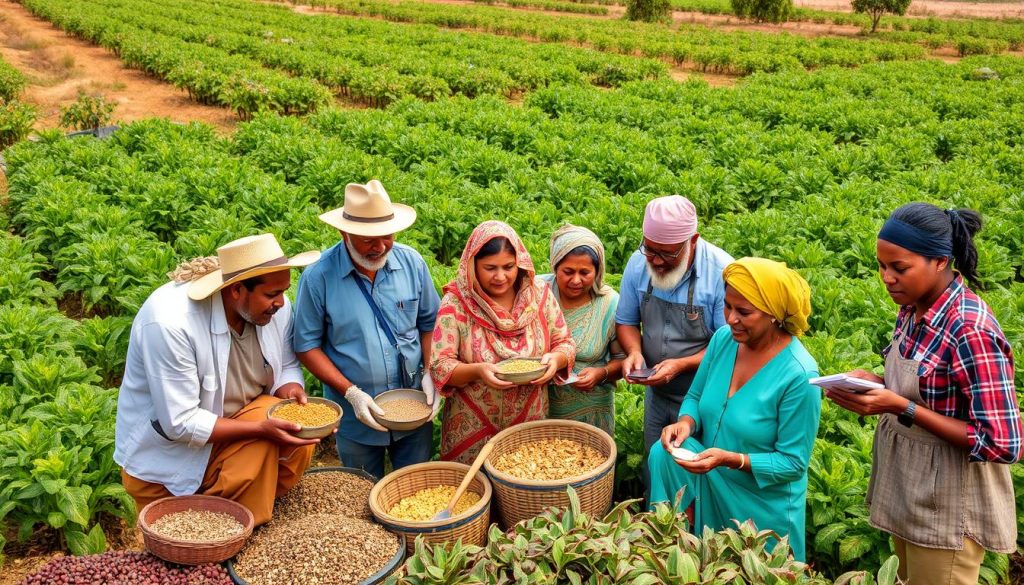
In Africa, partnerships in agribusiness are key to innovation and better productivity. They help connect different groups like private companies, governments, and research centres. By teaming up, they can share resources and know-how, tackling local and global market challenges.
Joint ventures have become a strong tool for progress in agribusiness.
Good partnerships can bring many benefits:
- They help get better seeds through joint research.
- They offer training to improve farming skills everywhere.
- They work together to create lasting agricultural solutions.
- They make it easier to find funding by sharing investment plans.
These partnerships not only boost local economies but also help ensure food is available in the region. When different groups work towards the same goals, they can face challenges together. This makes the agribusiness sector more resilient.
Insights from Successful Agribusiness Ventures
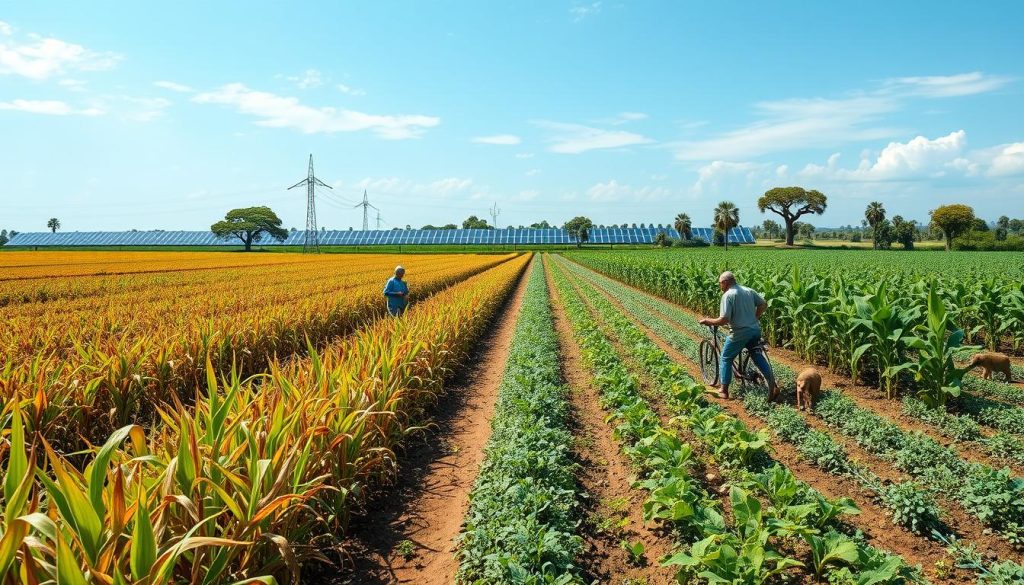
Across Africa, many agribusiness ventures have shown the way. They share effective practices and strategies. By looking at these projects, we can learn how to grow and sustain agriculture.
These ventures show how working together and being innovative can boost local farming. They also help farmers compete in the global market.
Case Studies of Notable Projects
In Ethiopia, coffee cooperatives are a great example. They focus on community and fair trade. This has improved coffee quality, helping farmers and exporters.
Kenya’s flower exports are another success story. They use advanced techniques and meet global quality standards. This has made Kenyan flowers well-known worldwide.
These stories teach us important lessons. By studying them, new businesses can learn about making production better and managing supply chains. This helps them succeed in different farming areas.
Accessing Funding and Financial Resources
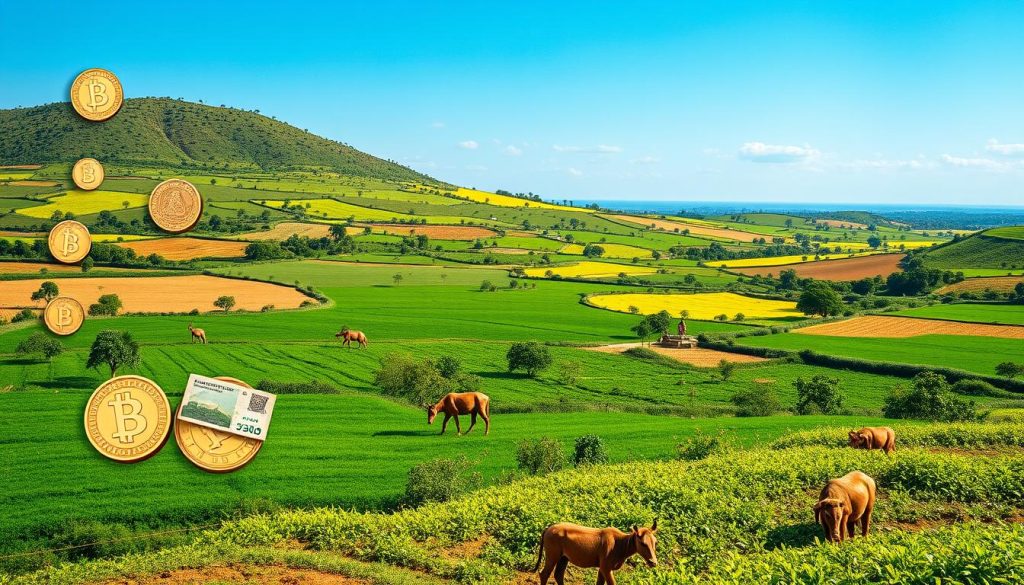
Finding the right funding is key for agribusiness success in Africa. There are many ways to get financial help, like government grants, impact investments, and microloans from NGOs. These options help farmers and businesses grow and stay stable.
Fintech has become a big help in getting loans for farmers, especially small ones. It makes getting money easier and faster. Using fintech is important for investors and entrepreneurs wanting to succeed in African agribusiness.
- Government grants aimed at supporting agricultural development.
- Impact investments that prioritise social and environmental benefits.
- Microloans from NGOs to assist small-scale farmers.
- Fintech solutions that simplify financing processes.
It’s important to know about the different funding options available. This helps investors find good opportunities in agribusiness.
Future Outlook of Agribusiness in Africa
The future of agribusiness in Africa looks bright, with a lot of growth ahead. As more people move to cities, there’s a big need for food. This is a great chance for investors and farmers to change how we grow food in Africa.
New technologies like precision farming and hydroponics are making farming better. They help farmers grow more food and do it in a way that’s good for the planet. Working together, local and international companies can make farming even more efficient and sustainable.
Africa is getting better at growing and selling food, thanks to better roads and markets. To keep this growth going, we need to focus on farming that’s good for people and the planet. With these efforts, Africa’s agribusiness could be a big success, helping feed people and grow the economy for years to come.

